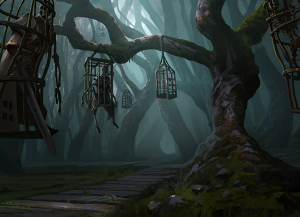Are you a Quiet Speculation member?
If not, now is a perfect time to join up! Our powerful tools, breaking-news analysis, and exclusive Discord channel will make sure you stay up to date and ahead of the curve.
Welcome back, readers!
Normally I like to focus on macro-level trends in the MTG realm, with some occasional spec picks. I've done several articles on starting an MTG store before. This week's article will focus on some common pitfalls you want to avoid as a store owner.
These pitfalls are compiled from both my own and fellow players' feedback about their experiences at different stores. This isn't meant to be a giant rant, but instead I want to take a step back (especially from any of my own personal experiences), and review what potential consequences might come about from a store engaging in any of the practices below.
Sharing Personal Opinions
Everyone is entitled to their personal opinion. But remember that your opinion is just that—yours—and it's highly likely to differ from that of your customers. When you openly discuss volatile subjects (religion, politics, etc.) you risk offending or ostracizing people who disagree with you. The closer your opinions fall to any end of a particular spectrum, the greater the risk, and the more likely you are to lose customers because of it.
This issue extends to social media (especially as more stores realize the power of social media for advertising events, sales, etc.). It’s crucial to realize your online profile is tied to your business (whether you like it or not), and remarks/comments/opinions you express on personal accounts can reflect poorly on your business and alienate customers.
Simply put, feel free to discuss your personal opinions with your friends and family all you want—but leave your customers out of it.
Inconsistent Prices
As a business you’re welcome to charge whatever you want for any card. Only you really know your overhead costs (if you don’t, stop reading now and figure that out immediately as misunderstanding that will sink a business faster than anything on this list), and thus only you know what profit margin is required to stay afloat.
However, one issue I’ve seen that really bugged customers was when different employees at a store priced the same card differently (on the same day). Obviously card prices can change, especially if some hot new tech shows up on camera at a major event. But what I’m specifically talking about is when a store’s pricing is amorphous and certain employees try to charge more for a specific card to make a higher profit margin over others.
Long gone are the days when card prices were adjusted monthly with the latest Inquest or Scry magazine with a new pricing sticker placed on top of an old one. Today most customers expect a store to look up the price of a card upon checkout. The only exception is at a major event where everything is pre-priced for the day/hour—but those customers still don’t expect to get a worse price from one employee over another.
Not Scaling Prize Support
Competitive players spend a lot of money in order to play competitively. They expect good prize support when entering tournaments. A store obviously wants to make some sort of profit from hosting a tournament, and there is often additional costs associated with doing so such as hiring a judge, keeping a larger staff on the clock, etc. However, good Magic players can do basic math and multiply the number of players by the tournament entry fee to figure out how much income the store made from the tournament.
This usually becomes an issue when a set prize is announced ahead of time to garner attention, and then when more players show up than originally expected the store decides not to add to the prize. Sometimes it’s important to consider how you’d feel on the other side of the counter.
Disorganization
Inventory
 We live in a time when you can get most anything you need with free two-day shipping. We can get information on just about anything we could ever want instantaneously from any location with cell coverage or Wi-Fi.
We live in a time when you can get most anything you need with free two-day shipping. We can get information on just about anything we could ever want instantaneously from any location with cell coverage or Wi-Fi.
Patience is a dying virtue. People want to be able to see and buy their cards quickly. Nothing stalls a potential sale like responding to an inquiry with, “I don’t know, I’ll have to go look for it.”
There is also the obvious need to have an online presence, which again requires an organized inventory. Customers expect their cards to arrive quickly after ordering online (and TCGplayer actually expects sellers to ship within 48 hours of purchase). This can be extremely difficult and time consuming in a disorganized environment—and time spent is money spent. Luckily there are plenty of software packages that can allow for decent inventory management without too much cost.
Operations
Most people prefer order to chaos, and that extends to business preferences. When your business doesn’t have consistent operating hours, doesn’t fire tournaments on time, or is under- or overstaffed, it highlights instability to customers and discourages business.
One of the most common problems I’ve seen at numerous stores is delaying a tournament start for people who are running late. While it comes off as being generous to the people who are late, it ignores the time being wasted for those who showed up on time, and leads to resentment and general unhappiness. When you develop a pattern of doing this, you actually discourage punctuality—if you’re going to have to sit around at a store waiting on others, why not show up late knowing that the tournament will wait on you?
Lack of Cleanliness
While most people don’t enjoy cleaning—and let’s be fair, Magic players can be pretty messy at times—a store needs to be well maintained. You want to attract younger Magic players to grow your business and keep the game going. Having a smelly or dirty store is an easy way to turn away parents bringing their kids to enjoy the game those kids love.
It’s also important in order to attract female gamers (as I think most would agree that women often care more about cleanliness than men, especially when it comes to bathrooms). My wife doesn’t go into most game stores after some bad experiences in the past (which is a shame, but I can’t argue when there is a stale odor that permeates the store).
 This can also lead to a bit of an uncomfortable discussion with some players in the community. My two best friends (who happened to be two of my groomsmen) used to play Yu-Gi-Oh. Both told me stories about how 8-10 years ago it was common for players not to bathe for extensive periods of time, and to use their terrible smell as a way to gain an advantage on an opponent through distraction/disgust. This was such a problem that tournament organizers started disallowing players with excessive body odor from participating in their tournaments.
This can also lead to a bit of an uncomfortable discussion with some players in the community. My two best friends (who happened to be two of my groomsmen) used to play Yu-Gi-Oh. Both told me stories about how 8-10 years ago it was common for players not to bathe for extensive periods of time, and to use their terrible smell as a way to gain an advantage on an opponent through distraction/disgust. This was such a problem that tournament organizers started disallowing players with excessive body odor from participating in their tournaments.
Luckily, I haven’t seen that be an issue with Magic, however, there are still some people who don’t practice good hygiene. While it’s their business anywhere but in your store, it becomes yours when it grosses out or turns away customers (and your business suffers because of this).
The same goes for store owners. I understand how much time one must spend at their shop to run it properly, but you are the face of the company. It’s not a difficult stretch for customers to think that a store owner who can’t take care of their own life surely can’t take care of a store.
Poor Inventory Visualization
While it’s not uncommon to have significantly more sales online than in store (especially nowadays), it’s important to keep in mind that a sparse store inventory will make local players believe you don’t have much in stock, and they will be less likely to bother asking for any cards period.
Remember that when you sell online, the marketplace gets a cut of the sale (TCGplayer and eBay both take around 13% overall), so in-store sales by definition are likely to have a higher profit margin for you as the owner.
You will also see more “splurge” buys when cards are visible to players. There are tens of thousands of different Magic cards, and it’s difficult even for those of us who have been playing a long time to remember them all. When your case is sparsely populated, you miss out on those “aha!” buys from players who forgot a card existed and suddenly decided they needed it for the deck they are brewing. This also serves as a good way to encourage players to “trade up” into more expensive staples, allowing you to make a larger profit overall.
Failure to Maintain a Fun/Inclusive Environment
We can all agree that Magic has all different types of players, with different definitions of fun. This isn’t a problem when players in a game have a similar view of fun, however, it can become a pretty big issue when they don’t.
This is more likely to occur in casual environments, when the majority of players just want to play the game, but another player wants to win at all costs or to play “griefer” decks. While it’s perfectly fine for everyone to play together, as a store owner you need to make sure that some of your players aren’t driving away others.
The trick is to make sure that your game store can accommodate these different types of players without excluding one type or another. One of the best methods I’ve seen, in Commander specifically, is the implementation of a point system that encourages fun/casual play and discourages win-at-all-costs/griefer play. This doesn’t mean that all Commander games need to follow this point system, but if you establish beforehand whether or not a game will utilize it, you can prevent bad feelings/unhappiness from the beginning.
In a similar manner, Magic players come from a lot of varying backgrounds with varying opinions, and it’s important to make sure your store environment is inclusive towards everyone without isolating or ostracizing anyone. Now, that doesn’t mean you remain lawless; simply make sure that all players show respect towards each other. Similar to the concerns about sharing opinions that I covered above, it’s important to keep the general store atmosphere neutral when it comes to hot-button issues.





One thing I’m curious about is I notice most card game stores have big tables for Warhammer miniature games. On average, how much money does this bring in? This might be my MtG bias kicking in, but I feel like these tables take up a lot of space that could be better served for more card game tables, or retail shopping space, as some of my venues pack us card game players in like sardines.
One store in particular has their Warhammer tables set up at the store’s entrance, and every time I walk in I get smacked with a stench, and for good reason — these players are standing around a table for up to hours on end. At the very least, I feel like all store owners should keep these tables in the back room; you don’t want your customers greeted by a stench first thing as they walk in.
My understanding, as a Warhammer player and from talking with store owners, is that this game is very profitable to those stores that provide enough support for it and the table space is well worth it.
It might also be proper not to make such generalizations regarding odors and players of a particular game. Gamers in general have a stereotype of being dirty, unwashed and smelly. This isn’t just a warhammer phenomenon.
In Warhammer though, players consistently have to stand when playing to reach the game’s tall tables, whereas with card games the players are sitting down (at least at the venues I attend). Over the course of multiple hours, the average player standing up is going to sweat more than a player sitting down; if that player hasn’t bathed, that could be problematic.
I’m not generalizing, but rather how they play might predispose a player who hasn’t bathed into being more smelly, so I’d rather their tables be situated in the back of a store.
I like this line of conversation. What your initial question hints at is a metric of dollars brought in/surface area..which I feel could make for an interesting article. As for Warhammer itself..I used to play the original fantasy version which was a lot of fun (and rather expensive)..but that was back when a lot of the models were still metal..I don’t know what prices are now.
Great message, well done!
Thanks pi. I imagine many store owners don’t suffer from all these issues, but it’s easy to miss these types of problems/issues if you aren’t looking for them.